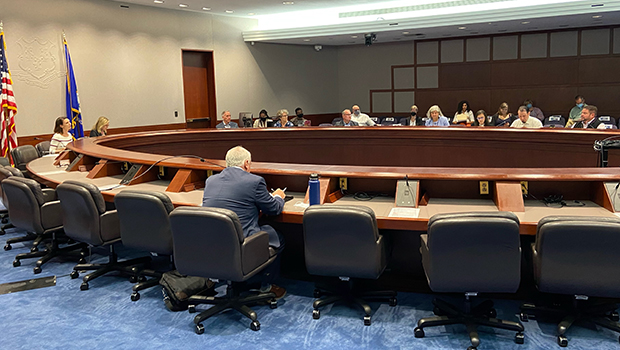The $150 million in state grant funding now available for schools to use in fixing and updating HVAC systems is a big boost, but members of the state task force charged with making recommendations to improve indoor air quality in schools say there’s a lot more left for Connecticut to do.
At their first meeting last week, task force members learned more about the new state grants and discussed what will be included in the group’s final report, due to the legislature in January.
“This is a monumental task, and I know many of you have been working on the issue for decades,” said task force co-chair Senator Julie Kushner.
She said that the task force is charged with looking at a range of issues including optimal temperature ranges for schools, emergency school closure criteria, protocols to address complaints, and the frequency of inspections and uniform evaluations.
CEA Legislative Coordinator Louis Rosado Burch is representing CEA on the task force and told committee members that the need to improve air quality in many Connecticut schools is urgent, as 35% of workers’ compensation claims by CEA members are related to poor indoor air quality.
Task force members expressed concerns that, because applications for the new state HVAC grants require a variety of documentation and are due December 1, the only districts that will be able to comply with the deadline are those that already have HVAC projects in the pipeline.
Department of Administrative Services Deputy Commissioner Noel Petra said that applications must be in by December 1 to meet the statutory deadline, but clarified that his staff will do what they can to evaluate whatever information districts are able to submit by that date.
“This is a data gathering year,” he said. “Give us whatever you have. We’ll aggregate the information to try to demonstrate what the need is and share it with the legislature and governor.”
“This is the beginning of addressing a big issue here in the state,” said Kushner, who has been a strong advocate of measures to improve school air quality. “It will be helpful to the legislature to have more information so we can better evaluate the need.”
She added that it will be important for the legislature to continue improving school HVAC systems through funding and through statutory approaches next legislative session.
Last legislative session, a coalition that included CEA and many other organizations came together around the urgent need to address indoor air quality in schools, and Kushner acknowledged the group’s success in convincing lawmakers to set aside funding for school HVAC upgrades.
“There was a large coalition of organizations and stakeholders that worked very hard to get this into the implementer and your work was so appreciated by the legislature, because without your work we could not have gotten it done,” she said.
The task force plans to hold its next meeting in early October.







